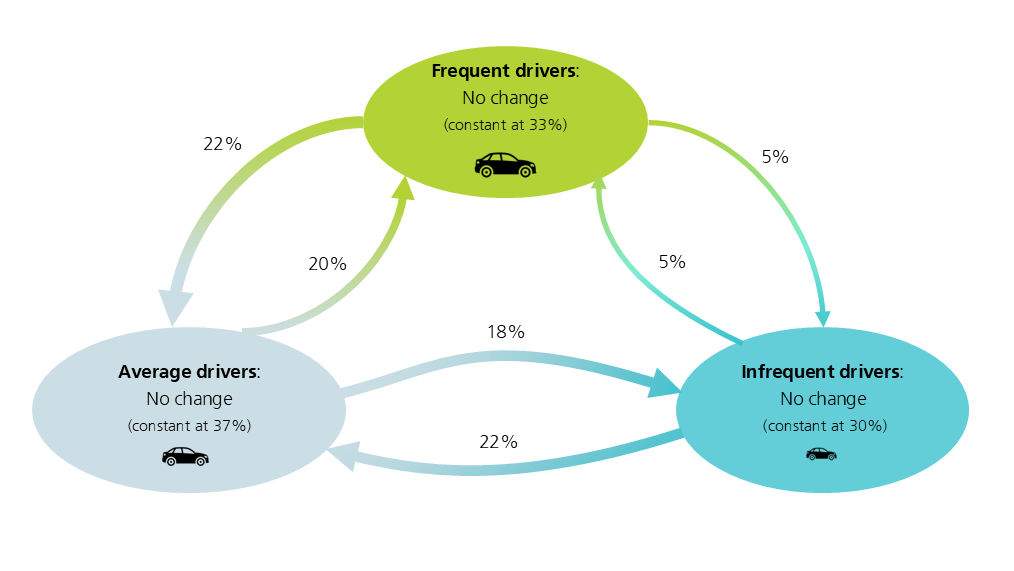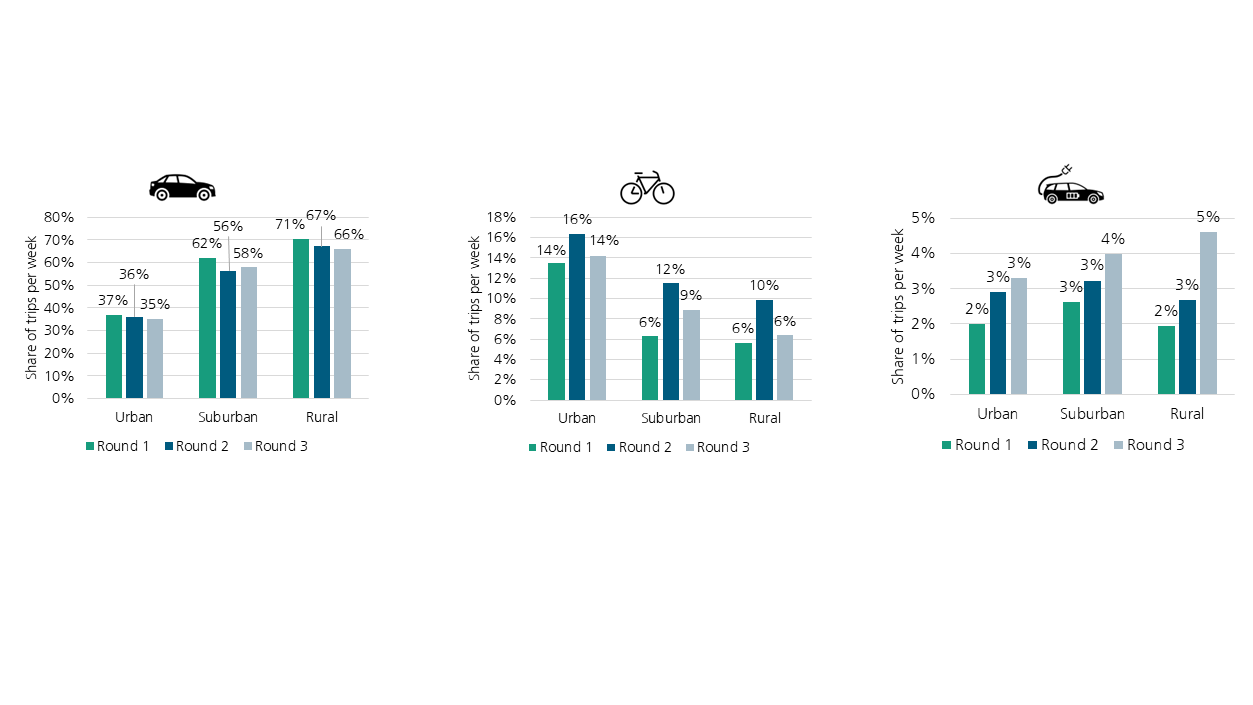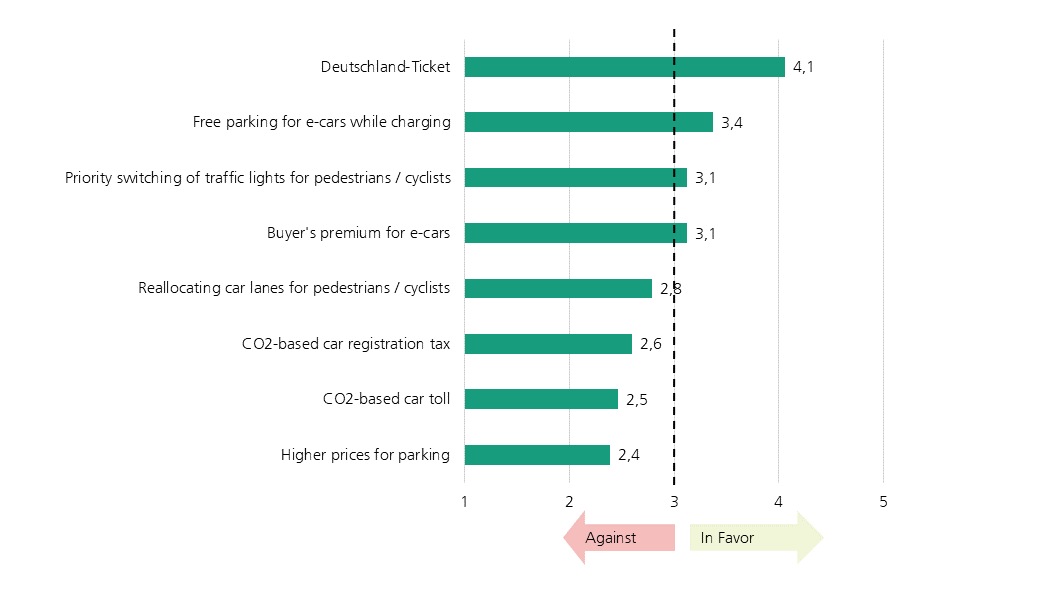Sustainable mobility: How habits can change
In the MobilKULT project, Fraunhofer ISI is exploring how individual mobility habits, experiences with infrastructure, attitudes toward different modes of transport and opinions about policy measures are changing. Every six months, the research team conducts a representative survey. In the last two rounds, the focus was on the Deutschland-Ticket (a subscription ticket for local public transport across Germany) – which, according to the study, has the potential to shift mobility toward more sustainability.
The Deutschland-Ticket has been available for one year and entitles its holders to use the entire local public transport network across Germany. One of its objectives is to replace as many car trips as possible by bus and rail. How well this is working has recently been examined by a research team from Fraunhofer ISI as part of a regular survey.
The MobilKULT project began in winter 2022/23. Since then, researchers have been asking a representative sample of around 2,500 people from the German states of Baden-Württemberg and Mecklenburg-Western Pomerania to answer questions about their mobility habits every six months. The study covers both urban and suburban areas as well as rural regions with very different types of infrastructure and transport options. The participants answer questions online about their mobility habits and give their opinions on infrastructure, modes of transport and policy measures. Three survey rounds had been completed by the beginning of 2024 that reveal both continuities and changes.
The researchers first divided the participants into three groups based on car use: Infrequent drivers do not drive very often and use cars for 10 percent or less of the trips made; frequent drivers use cars for 90 percent or more of trips; and average drivers use cars for between 10 and 90 percent of their trips. Unsurprisingly, the group of frequent drivers is largest in rural areas and smallest in urban areas and vice versa for infrequent drivers.
Across the three survey rounds, some people have moved from one category to another, mainly between infrequent and average car users – in general, however, these offset each other and the groups have largely remained stable. Dr. Josephine Tröger, the project manager at Fraunhofer ISI, says: “This clearly shows the significant influence that infrastructure has: Cars dominate everywhere, but the more possibilities there are to use local public transport, for example, or an active form of mobility – cycling or walking – the more people choose these on a daily basis”.
Habits are slow to change
When asked about their habits, participants reported small but significant changes: Outside urban areas, the use of cars with internal combustion engines has decreased slightly and more electric cars are being driven. At the same time, rural regions are especially susceptible to seasonal effects – in summer people use their bikes more than in winter (10 percent of trips compared to 6 percent) and the difference is also bigger in suburban areas than in urban areas.
With regard to future plans, about one-quarter of the frequent drivers indicated that they wanted to walk or cycle more in the future. Marvin Helferich from the project team has observed: “The willingness to change has decreased slightly across the three rounds of the survey, but is present in all regions, not only in urban areas but also and especially in suburban areas and in the countryside.”
Dissatisfaction with transport policy but a positive view of the Deutschland-Ticket
A third focus of MobilKULT is on people’s opinions of policy instruments. In the latest survey, respondents said they were missing clear signals, the strong will and a clear vision on the part of the federal government on how to reduce transport-related emissions.
Those taking part in the survey rated four transport policy measures positively and consistently across the different rounds of the survey: The Deutschland-Ticket, free parking for electric cars while charging, priority switching of traffic lights for pedestrians and cyclists and the buyer’s premium for electric cars. However, the latter was scrapped by the federal government during the last survey period.
The Deutschland-Ticket is by far the most popular instrument, which is also demonstrated by the rise in the number of people owning one. At present, 21 percent of those surveyed have one, although the quota varies strongly between urban (32 percent), suburban (18 percent) and rural areas (11 percent). There is not much room for improvement as Dr. Elisabeth Dütschke from the MobilKULT project team emphasizes: “Only three percent of those who currently do not have a Deutschland-Ticket plan to buy one. This shows that its market potential under the current conditions is probably exhausted at 20 to 25 percent of Germany’s population”.
Reliable and available local public transport is essential – everywhere
Among those owning one, the ticket has achieved its purpose according to the MobilKULT results: The comparison of transport use before and after purchasing a Deutschland-Ticket shows an increase in the share of trips made using public transport by nine percentage points (from 29 percent to 38 percent). At the same time, car use has decreased by 5 percentage points. In addition, the users of a Deutschland-Ticket plan to use public transport even more in the future.
The MobilKULT results also indicate how to get even more people using local public transport. Among other things, most respondents think that local public transport is suitable for special activities. The researchers therefore suggest that special campaigns could lower the barriers to using public transport – for example, hotels in Germany could offer their guests a Deutschland-Ticket.
However, they also point out that improving the reliability and availability of local public transport in urban, suburban and rural areas is crucial for long-term sustainable mobility that meets people’s needs and requirements.
About the project
MobilKULT is part of KAMO – Karlsruhe Mobility High Performance Center / Profilregion. KAMO is the central point of contact in Karlsruhe for innovative mobility solutions for trans-regional and international players in industry, politics and civil society.
Always up-to-date
The Fraunhofer Institute for Systems and Innovation Research ISI analyzes the origins and impacts of innovations. We research the short- and long-term developments of innovation processes and the impacts of new technologies and services on society. On this basis, we are able to provide our clients from industry, politics and science with recommendations for action and perspectives for key decisions. Our expertise is founded on our scientific competence as well as an interdisciplinary and systemic research approach.


